牛津译林版单元复习学案 (8B Unit2)-2019年精选学习文档
- 格式:doc
- 大小:74.51 KB
- 文档页数:9
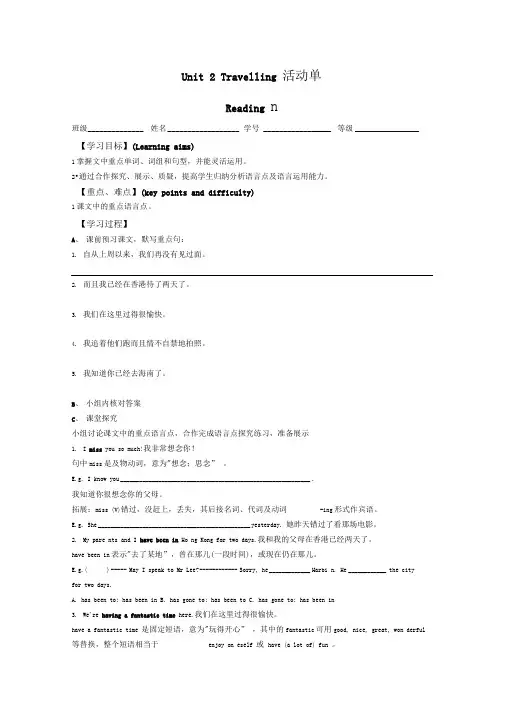
Unit 2 Travelling 活动单Reading n班级______________ 姓名__________________ 学号 _________________ 等级________________ 【学习目标】(Learning aims)1掌握文中重点单词、词组和句型,并能灵活运用。
2•通过合作探究、展示、质疑,提高学生归纳分析语言点及语言运用能力。
【重点、难点】(key points and difficulty)1课文中的重点语言点。
【学习过程】A、课前预习课文,默写重点句:1.自从上周以来,我们再没有见过面。
2.而且我已经在香港待了两天了。
3.我们在这里过得很愉快。
4.我追着他们跑而且情不自禁地拍照。
5.我知道你已经去海南了。
B、小组内核对答案C、课堂探究小组讨论课文中的重点语言点,合作完成语言点探究练习,准备展示1.I miss you so much!我非常想念你!句中miss是及物动词,意为"想念;思念” 。
E.g. I know you ____________________________________________________________ .我知道你很想念你的父母。
拓展:miss (V)错过,没赶上,丢失,其后接名词、代词及动词-ing形式作宾语。
E.g. She ________________________________________________ yesterday. 她昨天错过了看那场电影。
2.My pare nts and I have been in Ho ng Kong for two days.我和我的父母在香港已经两天了。
have been in表示"去了某地”,曾在那儿(一段时间),或现在仍在那儿。
E.g.( ) ----- May I speak to Mr Lee? ------------ Sorry, he _____________ Harbi n. He ____________ the cityfor two days.A. has been to; has been inB. has gone to; has been toC. has gone to; has been in3.We're having a fantastic time here.我们在这里过得很愉快。
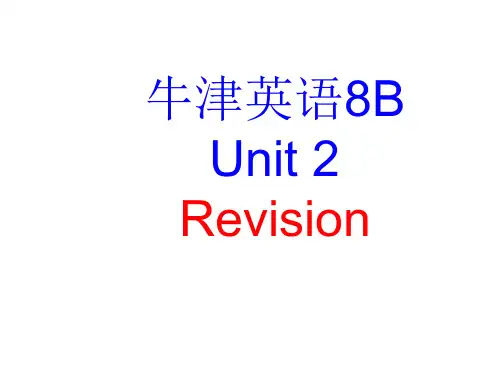
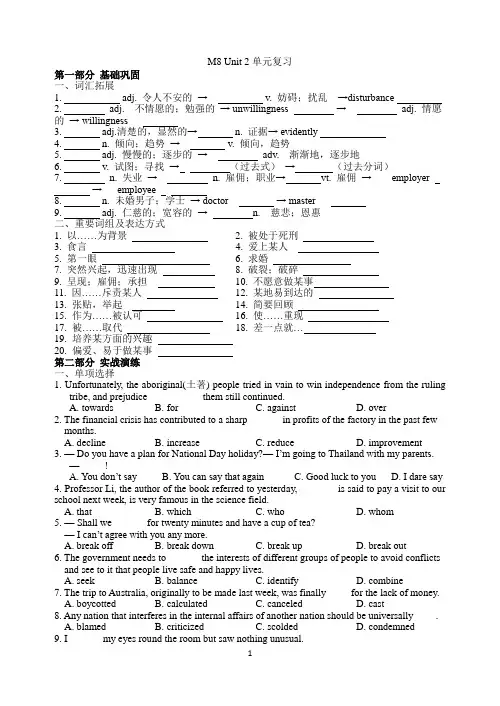
M8 Unit 2单元复习第一部分基础巩固一、词汇拓展1. ___________ adj. 令人不安的→ _________ v. 妨碍;扰乱→disturbance _________2. _______ adj. 不情愿的;勉强的→ unwillingness _______ → _______ adj. 情愿的→ willingness _______3. _______ adj.清楚的,显然的→_______ n. 证据→ evidently _____________4. _______ n. 倾向;趋势→ _______ v. 倾向,趋势5. _______ adj. 慢慢的;逐步的→ _______ adv. 渐渐地,逐步地6. _______ v. 试图;寻找→_______ (过去式)→ _______(过去分词)7. _______ n. 失业→ _______ n. 雇佣;职业→_______vt. 雇佣→ employer_______ → employee _______8. _______ n. 未婚男子;学士→ doctor _______ → master _______9. _______ adj. 仁慈的;宽容的→ _______n. 慈悲;恩惠二、重要词组及表达方式1. 以……为背景______________2. 被处于死刑______________3. 食言______________4. 爱上某人______________5. 第一眼_______ _______6. 求婚_______ _______7. 突然兴起,迅速出现_______ 8. 破裂;破碎______________9. 呈现;雇佣;承担_______ 10. 不愿意做某事______________11. 因……斥责某人______________ 12. 某地易到达的______________13. 张贴,举起_______ 14. 简要回顾______________15. 作为……被认可______________ 16. 使……重现______________17. 被……取代_______ _______ 18. 差一点就… ______________19. 培养某方面的兴趣______________20. 偏爱、易于做某事______________第二部分实战演练一、单项选择1. Unfortunately, the aboriginal(土著) people tried in vain to win independence from the rulingtribe, and prejudice __________ them still continued.A. towardsB. forC. againstD. over2. The financial crisis has contributed to a sharp ______ in profits of the factory in the past few months.A. declineB. increaseC. reduceD. improvement3. — Do you have a plan for National Day holiday?—I’m going to Thailand with my parents.—_____!A. You don’t sayB. You can say that againC. Good luck to youD. I dare say4. Professor Li, the author of the book referred to yesterday, _______ is said to pay a visit to our school next week, is very famous in the science field.A. thatB. whichC. whoD. whom5. — Shall we ______ for twenty minutes and have a cup of tea?—I can’t agree with you any more.A. break offB. break downC. break upD. break out6. The government needs to ______ the interests of different groups of people to avoid conflicts and see to it that people live safe and happy lives.A. seekB. balanceC. identifyD. combine7. The trip to Australia, originally to be made last week, was finally ____ for the lack of money.A. boycottedB. calculatedC. canceledD. cast8. Any nation that interferes in the internal affairs of another nation should be universally ____.A. blamedB. criticizedC. scoldedD. condemned9. I ______ my eyes round the room but saw nothing unusual.A. glancedB. threwC. staredD. cast10. — Have the police broken the case?—Yes, five men, including a pair of twins, have admitted robbery at the store, but _______ murder.A. deniedB. refusedC. rejectedD. declined11. After the glasses fell to the ground and broke, the little boy ______ his grandma about that.A. dare not tellB. dare not tellingC. dared not to tellD. didn’t dare tell12. They didn’t ________ the true meaning of what the boss had said, and thus their task almostcompletely failed.A. seizeB. catchC. takeD. grasp13. — Where do you plan to work?—I’ve made up my mind to go _______ I’m most needed.A. to the placeB. to whichC. thatD. where15. When solving the problem a second time, you’d better be more careful _______ you made a mistake.A. in caseB. whereC. in whichD. that二、根据单词的首字母或汉语意思填空。
![译林牛津八年级下册8B知识点梳理(2)[1]](https://uimg.taocdn.com/cfb4ebcded630b1c58eeb545.webp)
译林牛津八年级下册8B知识点梳理(2)(word版可编辑修改)编辑整理:尊敬的读者朋友们:这里是精品文档编辑中心,本文档内容是由我和我的同事精心编辑整理后发布的,发布之前我们对文中内容进行仔细校对,但是难免会有疏漏的地方,但是任然希望(译林牛津八年级下册8B知识点梳理(2)(word版可编辑修改))的内容能够给您的工作和学习带来便利。
同时也真诚的希望收到您的建议和反馈,这将是我们进步的源泉,前进的动力。
本文可编辑可修改,如果觉得对您有帮助请收藏以便随时查阅,最后祝您生活愉快业绩进步,以下为译林牛津八年级下册8B知识点梳理(2)(word版可编辑修改)的全部内容。
牛津初中英语8B unit1—unit8 知识点归纳8B Unit1【考点精讲】一、核心词汇1.past n.[考点点拨] past作名词,意为“过去”,其还可作介词和形容词,可用于如下情况:in the past (n.)在过去;half past(prep。
)five 5点半;in the past(adj.)three years在过去的3年里。
如:When he walks past our desks, he always knocks ourbooks and pens off the desks。
当他走过我们课桌的时候,他总是把我们的书本和钢笔从课桌上碰掉下来。
The boy finished his homework with the help of his father in the past。
这个男孩过去是在他父亲的帮助下完成作业的。
2.present n.[考点点拨]present作名词,意为“现在,目前”.At present=at the moment=right now目前;其还可作形容词,your present job你目前的工作;present用作名词,还可表示“礼物",a birthday present -份生日礼物。
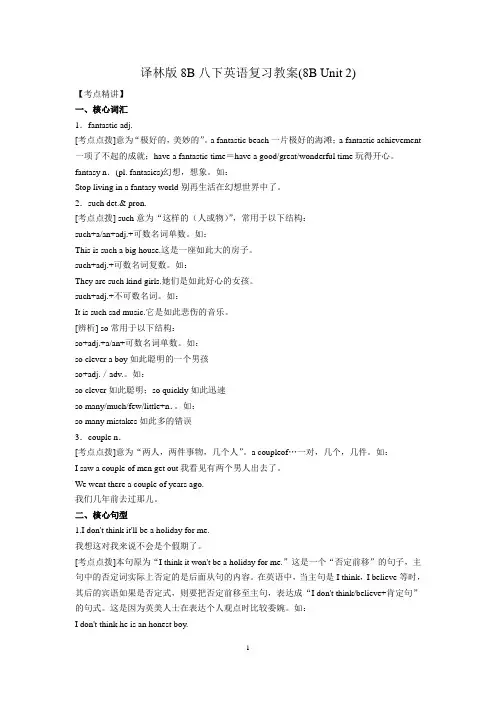
译林版8B八下英语复习教案(8B Unit 2)【考点精讲】一、核心词汇1.fantastic adj.[考点点拨]意为“极好的,美妙的”。
a fantastic beach一片极好的海滩;a fantastic achievement 一项了不起的成就;have a fantastic time=have a good/great/wonderful time玩得开心。
fantasy n.(pl. fantasies)幻想,想象。
如:Stop living in a fantasy world别再生活在幻想世界中了。
2.such det.& pron.[考点点拨] such意为“这样的(人或物)”,常用于以下结构:such+a/an+adj.+可数名词单数。
如:This is such a big house.这是一座如此大的房子。
such+adj.+可数名词复数。
如:They are such kind girls.她们是如此好心的女孩。
such+adj.+不可数名词。
如:It is such sad music.它是如此悲伤的音乐。
[辨析] so常用于以下结构:so+adj.+a/an+可数名词单数。
如:so clever a boy如此聪明的一个男孩so+adj./adv.。
如:so clever如此聪明;so quickly如此迅速so many/much/few/little+n.。
如:so many mistakes如此多的错误3.couple n.[考点点拨]意为“两人,两件事物,几个人”。
a coupleof…一对,几个,几件。
如:I saw a couple of men get out我看见有两个男人出去了。
We went there a couple of years ago.我们几年前去过那儿。
二、核心句型1.I don't think it'll be a holiday for me.我想这对我来说不会是个假期了。
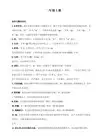
8B Unit2 Travelling一、翻译句子。
1. 我已经到达纽约三天了,我非常想念我的爸爸妈妈。
I _____________________New York for three days and I ____________my parents so much.2. 我们在寒冷的雪天滑雪玩得很开心。
We _____________________________________skiing _______________________________.3. 我爸爸去南京出差过两次了。
My father ________________________________Nanjing _______________________ twice.4. 三个月前,尼尔动身去了美国。
Neil ___________________________________ America ________________________.5. 看到几个可爱的钥匙环,我忍不住(情不自禁)买下了。
Seeing __________________lovely key rings, I could _______________________________.6. 春天是植树的最佳时期。
Spring is ___________________________________________________________________.7.这些书你可以借两周,但必须按时归还。
You can ___________________________for two weeks, but you must ________________________.二、用所给单词或汉语的适当形式填空。
1. When he woke up, he __________________(感受) a slight shake through his body.2. The old man has been ____________________(死) since two years ago.3. When I studied in Beijing, I lived in my _____________________(亲戚) house.4. Mount Huang is one of the most beautiful ______________________(高山) in China.5. How long ____________ they ________________________ (marry)?6. The couple ___________________(be) to Hong Kong many times.7. Everybody is here today ___________________(除了) Bob. He has gone to the USA.8. ---Where is Tom ? I can’t find him. ---He _____________(ride) to school since twenty minutes ago.三、单项选择。
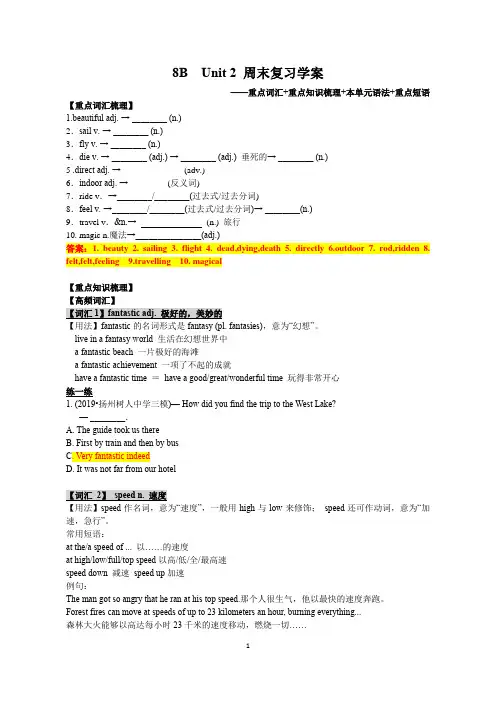
8B Unit 2 周末复习学案——重点词汇+重点知识梳理+本单元语法+重点短语【重点词汇梳理】1.beautiful adj. → ________ (n.)2.sail v. → ________ (n.)3.fly v. → ________ (n.)4.die v. → ________ (adj.) → ________ (adj.) 垂死的→ ________ (n.)5 .direct adj. →______________ (adv.)6.indoor adj. → ________ (反义词)7.ride v.→________/________(过去式/过去分词)8.feel v. →________/________(过去式/过去分词)→ ________(n.)9.travel v.&n.→ (n.) 旅行10. magic n.魔法→_______________(adj.)答案:1. beauty 2. sailing 3. flight 4. dead,dying,death 5. directly 6.outdoor 7. rod,ridden 8. felt,felt,feeling 9.travelling 10. magical【重点知识梳理】【高频词汇】【用法】fantastic的名词形式是fantasy (pl. fantasies),意为“幻想”。
live in a fantasy world 生活在幻想世界中a fantastic beach 一片极好的海滩a fantastic achievement 一项了不起的成就have a fantastic time =have a good/great/wonderful time 玩得非常开心练一练1. (2019•扬州树人中学三模)— How did you find the trip to the West Lake?— ________.A. The guide took us thereB. First by train and then by busC. Very fantastic indeedD. It was not far from our hotel【用法】speed作名词,意为“速度”,一般用high与low来修饰;speed还可作动词,意为“加速,急行”。

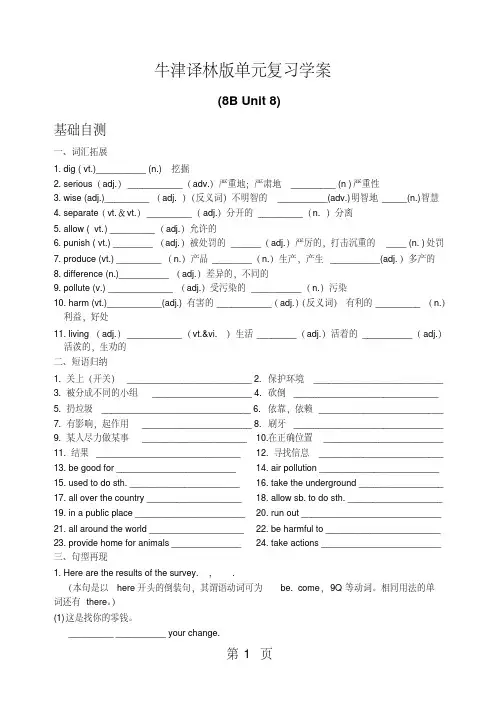
牛津译林版单元复习学案(8B Unit 8)基础自测一、词汇拓展1. dig ( vt.)__________ (n.) 挖掘2. serious(adj.)___________(adv.)严重地;严肃地_________ (n )严重性3. wise (adj.)_________(adj. )(反义词)不明智的__________(adv.)明智地_____(n.)智慧4. separate(vt.&vt.)_________(adj.)分开的_________(n. )分离5. allow ( vt.) _________(adj.)允许的6. punish ( vt.) ________(adj.)被处罚的______(adj.)严厉的,打击沉重的____ (n. )处罚7. produce (vt.) _________(n.)产品________(n.)生产,产生__________(adj.)多产的8. difference (n.)__________(adj.)差异的,不同的9. pollute (v.) _____________(adj.)受污染的__________(n.)污染10. harm (vt.)___________(adj.)有害的___________(adj.)(反义词)有利的_________ (n.)利益,好处11. living(adj.)___________(vt.&vi. )生活________(adj.)活着的__________(adj.)活泼的,生劝的二、短语归纳1. 关上(开关)_________________________2. 保护环境__________________________3. 被分成不同的小组____________________4. 砍倒_____________________________5. 扔垃圾______________________________6. 依靠,依赖_________________________7. 有影响,起作用______________________8. 刷牙______________________________9. 某人尽力做某事_____________________ 10.在正确位置________________________ 11. 结果_____________________________ 12. 寻找信息_________________________ 13. be good for ________________________ 14. air pollution ________________________ 15. used to do sth. ______________________ 16. take the underground _________________ 17. all over the country ___________________ 18. allow sb. to do sth. ___________________ 19. in a public place ______________________ 20. run out ____________________________ 21. all around the world ___________________ 22. be harmful to _______________________23. provide home for animals ______________ 24. take actions ________________________三、句型再现1. Here are the results of the survey. , .(本句是以here开头的倒装句,其谓语动词可为be. come,9Q等动词。

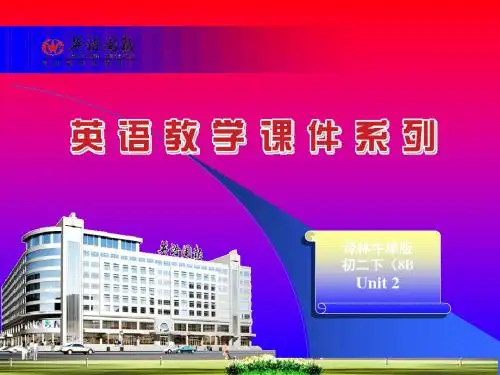
新版牛津译林8BUnit2知识点和语法讲解(语法讲解的很好,有讲有练)(word 版可编辑修改)编辑整理:尊敬的读者朋友们:这里是精品文档编辑中心,本文档内容是由我和我的同事精心编辑整理后发布的,发布之前我们对文中内容进行仔细校对,但是难免会有疏漏的地方,但是任然希望(新版牛津译林8BUnit2知识点和语法讲解(语法讲解的很好,有讲有练)(word版可编辑修改))的内容能够给您的工作和学习带来便利。
同时也真诚的希望收到您的建议和反馈,这将是我们进步的源泉,前进的动力。
本文可编辑可修改,如果觉得对您有帮助请收藏以便随时查阅,最后祝您生活愉快业绩进步,以下为新版牛津译林8BUnit2知识点和语法讲解(语法讲解的很好,有讲有练)(word版可编辑修改)的全部内容。
新教材牛津译林8B Unit2一、同步知识梳理知识点1:Can I join you?(P22)我能加入你吗?join v。
参加,加入【例句】Every young man in the village joined the fight。
【拓展】join/join in/ take part in 对比。
join +群体,组织。
He joined the Party (党)last year。
join in +活动。
If you cannot attend, you can still join in the conversation。
take part in +活动,比赛。
We still decided to take part in an important race across the Atlantic。
知识点2:I miss you so much.(P22)我非常想念你。
miss vt。
漏掉;错过;想念【例句】She went to the station to meet her husband, but missed.I'm going to miss her very much.。
初三英语组复习学案(8B unit 2 )By Chen Shuyou教学目标:1.掌握本单元重点单词,短语及句型。
2.掌握现在完成时的基本用法。
教学步骤:一.自学。
重点短语:1. 去旅行2. 一定很有趣3. 带某人外出几天4. 弄清楚,查明5. 喜欢参观不同的地方6. 全世界7. 分组训练8. 看到美丽的风景9. 照相10. 在春节期间11. 给某人写信12.高速行驶13. 买某物给某人作纪念品14. 比如15. 快乐的拍16.穿不同的服装17. 从公园穿过18. 停止拍照19. 禁止拍照20. 看起来闪闪发光21. 中国风格22.兴奋的尖叫23. 计划到国外旅行24. 一路上25. 去远足26.去滑雪27. 在入口处28.在这个短途旅行中29. 向、、、挥手30. 全年31. 鸟瞰、、、32. 文化中心33. 历史知识34. 回答问题错误35. 测试你的知识36 总计37.忍不住做某事38.迫不及待做某事39. 去过、、、40. 已去、、、二.互学。
重点句型1、我将去南山游玩。
__________________________________________________2、我去过那好几次了。
________________________________________________3、跟我家那只肥猫逗很有趣。
__________________________________________4、我是如此的激动以至于想把每样东西都带在身上。
I am ___________ that I want __________________________________________5、自打上个月以来我就没有见过你。
I have n’t seen you since ____________. /I haven’t seen you for___________________.6、你打算去哪度假?Where are you going_________________________________?7、过山车高速地行驶着,在整个过程中我不停地尖叫。
8B Unit21.I've been there be fore. 我以前去过那里。
①before副词“以前”。
常与现在完成时连用,也可与一般过去时连用。
He has never seen such a huge stone before.他以前从未见过这么大的石头。
②before介词或连词“在……之前”,可表示时间、位置、顺序等。
My father usually goes to bed before 9:00 p.m.我父亲通常在晚上9点之前睡觉。
(介词)Turn off the light before you leave the room.离开房间前关上灯。
(连词)3.Can I join you?我可以和你一起去吗?①join及物动词“加入”,表示加入某一组织、党派、社会团体或某一人群中,从而成为其成员。
join后常出现club,army,team,group以及表示人称代词宾格的单词等。
My father joined the army after he finished middle school.我爸爸中学毕业后就参军了。
Will you come and join us for supper? 你愿意来和我们共进晚餐吗?②take part in“参加/参与某项工作、活动、游戏或会议等”,强调参加者有积极的态度,并起到一定的作用。
take part in之后接名词或动名词。
=join in。
Would you like to take part in/join in the English party?你愿意参加英语晚会吗?Everyone can take part in gardening. 每个人都可以加入到园艺活动中来。
③join sb.in...“参加到……中”。
A lot of students are playing football on the playground. Let ’s jointhem in playing football! 许多学生正在操场上踢足球,咱们加入到他们当中吧!4.excited形容词为“感到兴奋的,感到激动的”。
牛津译林版单元复习学案(8B Unit 2)基础自测一、词汇拓展1. traveling (n.). _______(n. )(同义词)旅行;远足_______(n. )(同义词)旅行;行程2. fantastic (adj.)_______(adj.)(同义词)奇妙的,极好的____________(adj.)(同义词)极好的; 卓越的3. indoor (adj.)___________(adj. )(反义词)户外的4. cartoon (n.)_____________(n.)人物__________(n.)公主__________(n.)美人;美丽___________(n.)城堡____________ (n.)魔法5. pie(n.)_____________(n.)海鲜__________(adj.)美味的;可口的6. feel ( vt.)______________(V.)(过去式)感觉到__________(v.)(过去分词)感觉到___________ (n.)感觉7. dead (adj.) _____________(vi. )死____________ (n. )死亡____________(adj. )(反义词)活的;生动的______________(Vi.)活;生存_____________(n.)生存;生活8. sailing(n.)____________(n.)滑雪运动__________(n.)溜冰;滑冰9. view(n.)____________(n. )高山__________(n.)沙;沙滩___________(adj.)海边的10. flight (n.) _________(n.)机场11. relative (n.)___________(n.) 叔叔_____________ (n.)阿姨;姑妈二、短语归纳1. 长城__________________________2. 自由女神像_______________________3. 度过一段美妙的时光_____________4. 一个室内过山车___________________5. 以高速_________________________6. 一些迪士尼卡通人物________________7. 例如___________________________ 8. 一年到头__________________________9. 水上运动________________________ 10. 五一假期__________________________ 11. 出差_________________________ 12. the Learning Tower of Pisa ____________ 13. Tower Bridge ___________________ 14. hurry to a restaurant __________________ 15. take photo's ____________________ 16. a 4-D film __________________________ 17. a couple of key rings _____________ 18. at the end of ________________________ 19. go for a picnic __________________ 20. theme park _________________________21. a direct flight to Chengdu ______________________22. a seafood restaurant ___________________________三、句型再现I ran after them and couldn't stop taking photos.(can't stop doing sth. 意为“情不自禁;忍不住一直做某事”。
)我们在看《猫和老鼠》时忍不住一直大笑。
We _________ _________ ___________when we watched Tom and Jerry.要点聚焦1. such as 例如课文:On the way, we meet some Disney cartoon characters, such as Snow White and Mickey Mouse.在路上,我们遇到一些迪士尼卡通人物,例如白雪公主和米奇。
辨析:我有一些好朋友,例如,汤姆、凯特、露茜。
Ball games, for example, have spread around the world.2. Feel vt. 感觉到;意识到课文:We could even smell the apple pie and feel the wind.我们甚至可以闻到苹果派的味道并且感觉到风。
拓展:not feel oneself 感觉身体不舒服feel 讥. 觉得;摸索feeling n. 感觉;触摸a feeling of hunger/excitement/sadness一种饥饿/兴奋/悲伤感I am not feeling myself. 我感觉身体不舒服。
She felt the child's forehead to see if he had a fever.她摸孩子的前额去看他是不是发烧了。
This feeling of hunger is so terrible.这种饥饿感如此可怕。
相约中考:(2019.南京) When the monkeys saw Myers and his students, they ________(感到) angry.3. marry vi &vt结婚;嫁;娶课文:They have been married for 15 years. 他们已经结婚15年。
拓展:marry sb. 嫁给/娶某人maru A to B把A嫁给Bmarried adj. 已婚的marriage n. 婚姻,婚烟生活get/be married结婚be married to sb. 与某人结婚She has been married for three years. 她已婚三年。
课文:She can go there in any season except winter 除了冬天,她可以在任何季节去那儿。
辨析All of them went out for a walk except John.除了约翰,他们全都出去散步了。
It was dark in the city except for a few weak lights.除了一点微弱的灯光,城市一片黑暗。
Does Tom know any foreign language besides French?相约中考(2019.泰州) You can find the following information in the poster __________(除了……之外) the place of the cinema.5 business n. 公事;商业;生意课文:My dad has been to Chengdu on business twice.我爸爸去成都出差过两次。
拓展:business is business 公事公办business n. 职责;企业run a business 经营一家企业none of one's business 不关某人的事Business is business, you have to pay the rent. 公事公办,你要付房租的。
I plan to run a business of my own in five years.我计划五年内开一家自己的公司。
相约中考(2019. 无锡) The Water ATM is new and important part of Sarvajl’s __________(生意).二、句型突破1. I don't think it'll be a holiday for me.我想对我而言这不会是什么假期了。
点津:这是一个否定前移的句子,主句中的否定词实际否定的是从句中的内容。
当主句含有I think,I believe,I suppose等词语时,常用否定前移。
这一语言现象说明英美人在表达个人观点时较为含蓄。
注意在翻译此类句子时切忌直译。
I don't think you are right. 我认为你不对。
自从上个星期我们就没见过面了。
点津:现在完成时常和since或for引导的表示一段时间的时间状语连用。
注意:在带有一段时间状语的现在完成时的肯定句中,通常用延续性动词,而不能用短暂性动词。
He has lived in Beijing since 2019.自2019年以来,他一直住在北京。
She has been away from China for two years.父母和我在香港呆了两天。
点津:在现在完成时中常用have/has been to表示某人曾经去过某地,并且已经回来I同时用have/has gone表示某人已经去了某地,但还没回来;have/has been in表示某人已经在某地待了多长时间;have/has been away表示某人离开某地,后面必须跟for+一段时间或since+时间点,注意区别四者的用法。
We have never been to Fragrance Hill.我们还从来没去过香山。
---Is Tom at home?----No, he isn't. He has gone to the cinema.——汤姆在家吗?——不在。
他去看电影了。
They have been in China for one year.他们在中国已经一年了。
He has been away from Shanghai for 5 days.他离开上海已经5天了。
She has been away from Shanghai since Friday.4. Hope you've enjoyed yourself there!希望你在那儿玩得开心!点津:这是一个省略句型,省略了主语l,完整的句子是:I hope (that) you've enjoyed yourself there!在非正式行文. (包括日记、卡片、便条、信件等)中,有时我们会省去主语,使文字更简洁。